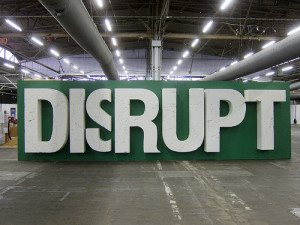 When thinking about disruption, I think we automatically associate “bad” with the term. We believe a disruption is something out of the ordinary, or something that requires attention or change. When we look at dictionary.com, one of the definitions is: “ e.g. The news disrupted their conference.” From this perspective, disruption is a negative. However, I would suggest there’s another perspective that leaders should consider – it’s neither good nor bad; it’s simply necessary.
When thinking about disruption, I think we automatically associate “bad” with the term. We believe a disruption is something out of the ordinary, or something that requires attention or change. When we look at dictionary.com, one of the definitions is: “ e.g. The news disrupted their conference.” From this perspective, disruption is a negative. However, I would suggest there’s another perspective that leaders should consider – it’s neither good nor bad; it’s simply necessary.
Not “disruption for disruption’s sake” on a regular basis, but disruption to cause innovation, creativity and ideas to form that would not have otherwise surfaced. Think about Jeff Bezos’ recent purchase of the Washington Post. What could these two businesses possibly have in common? On the surface, not much. However, Bezos is known for innovation and doing things differently. So no doubt it will be a disruption to the status quo at the Post, but I don’t think that’s necessarily a bad thing.
The printed newspaper and the “news” industry in general has resisted change for decades. The decline has been steep and no doubt “an end” will happen at some point. The real question is what does that look like? Bezos must certainly have a vision about news reporting and distribution as he had for Amazon. Most doubted Amazon could be the company it is today. It fundamentally changed the way we buy, and the way we are marketed to, so what better “disrupter” than Bezos to take over the mighty Washington Post?
I’m actually excited to see what he has in mind. I hope he preserves what is great about real news – not only reporting on what has happened, but if done well, disrupting what someone is doing or what we think about something. That’s what investigative news used to be – think Watergate.
Are you a disruptive leader? There are both good and bad versions of this. A bad disruptive leader likes to keep people on edge and changes things “just because” thinking that is leadership. People tend to shy away from this type of leader and never really know where they stand or what the real direction is they should be pursuing. This leads to feelings of vulnerability and insecurity (translation, less productivity). A good disruptive leader knows when something needs a shake-up, when a process, person or procedure has outlived its usefulness in the current form. They ask questions about what is or what could be so they help their people see different solutions. And mostly, they let others find solutions after the “disruption” has occurred.
So what in your organization needs a bit of disruption? Who in your leadership team is particularly good at disrupting for innovation? No organization, leader, team or process is good forever, the more business morphs based on surrounding circumstances and data, the healthier it will be.
Go ahead, and purposefully disrupt a little. It might just be fun and you might end up with unexpected innovation as a result.
photo credit: Scott Beale via photopin cc
